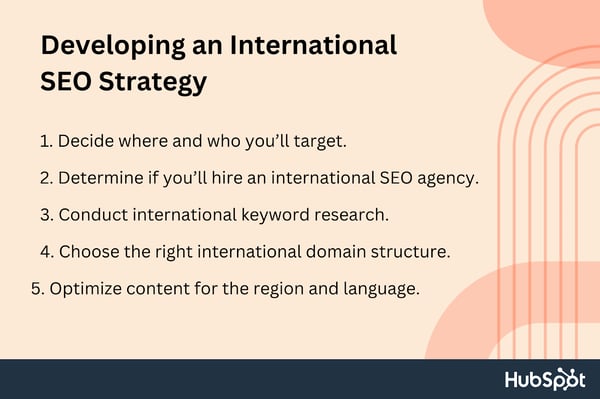Driving International Success: The Power of Strategic SEO Expansion
Driving International Success: The Power of Strategic SEO Expansion
Blog Article
Browsing the Digital Landscape: Leveraging International Search Engine Optimization for Cross-Border Success
In today's interconnected digital world, companies are significantly looking past borders to touch right into global markets. The intricacy of navigating the digital landscape on a worldwide scale demands a nuanced method, from recognizing the principles of International Search engine optimization to executing geotargeting and multilingual keyword strategies.
Recognizing International SEO Basics
Navigating the intricacies of global search engine optimization calls for a solid grasp of basic concepts to effectively increase on the internet visibility throughout boundaries. One critical element of worldwide SEO is comprehending the significance of localization. This involves customizing internet site material to suit the etymological, social, and business differences of target markets. Keywords need to be not just translated yet likewise adjusted to show just how individuals in various regions look for information.
In addition, having a clear understanding of geo-targeting is necessary. This entails indicating to online search engine the details nations or areas a website is targeting. Carrying out hreflang tags is one way to connect this information, making certain that the correct variation of a page appears in the search engine result for a user in a particular area.
Moreover, understanding the impact of regional search engines and social networks systems is important for global search engine optimization success. For instance, while Google is dominant in numerous areas, nations like China have their very own internet search engine like Baidu, requiring tailored methods for each and every platform to make best use of on the internet presence.

Targeting Multilingual Keyword Techniques
Establishing multilingual keyword approaches is essential for efficiently reaching diverse international target markets and optimizing on the internet presence across various etymological areas. When targeting multilingual keyword phrase strategies, it is critical to carry out comprehensive research study to recognize the particular search terms and phrases made use of by the target market in each linguistic region. This includes not just converting key phrases but additionally considering cultural nuances, local dialects, and search patterns one-of-a-kind to each target market.
To develop a successful multilingual key phrase approach, it is necessary to focus on significance and search intent. Keyword phrases need to line up with the web content on the site and resonate with the cultural context of the target market. Making use of devices such as Google Key Words Organizer, SEMrush, or Ahrefs can help recognize high-performing key words in various languages and evaluate their search volume and competitors level.
Additionally, monitoring and examining the performance of multilingual search phrases routinely is vital for enhancing and refining the technique over time. By continuously adjusting to changes in search behavior and trends, organizations can boost their on-line presence and bring in even more international traffic to their web sites.
Carrying Out Geotargeting and Hreflang Tags
When aiming to boost global search engine optimization methods, integrating geotargeting and hreflang tags is important for enhancing web site visibility throughout different regions. Geotargeting involves tailoring content to details locations, making sure that users in various areas receive appropriate details. By carrying out geotargeting, companies can boost their neighborhood search rankings and attract region-specific website traffic.

Optimizing Web Site Structure for Global Exposure
To better boost international search engine optimization strategies past geotargeting and hreflang tags, enhancing the website framework is necessary for attaining worldwide visibility and making best use of reach throughout different areas. A well-structured site not only enhances customer experience however likewise promotes online search engine crawlers in understanding the web content and context of the website. When intending for international exposure, it is critical to make sure that the web site is arranged in a sensible way that deals with customers from various countries. Carrying out a clear pecking order with distinct categories and subcategories can help in improving the website's navigation and user-friendliness.
Additionally, developing language-specific subdirectories or subdomains can help internet search engine provide the right version of the web site to customers based upon their language choices, internet better enhancing the overall individual experience. In addition, optimizing URL frameworks to consist of appropriate keyword phrases and geotargeted terms can boost the website's presence in different areas. By structuring the website efficiently for worldwide audiences, organizations can raise their opportunities of attracting international web traffic and broadening their reach throughout borders.

Surveillance and Analyzing Cross-Border Efficiency
Efficient tracking and analyzing of cross-border performance is necessary for reviewing the success of worldwide search engine optimization techniques and recognizing possibilities for enhancement in worldwide reach and exposure. By closely tracking crucial performance indications (KPIs) across various markets, companies can obtain valuable understandings into the efficiency of their cross-border SEO initiatives. Monitoring metrics such as organic website traffic, keyword rankings, conversion rates, and bounce prices can give a thorough view of exactly how well an internet site is doing in various areas.
By contrasting efficiency throughout various countries, areas, or languages, business can identify successful methods and localize content to better cater to specific target audiences (International SEO). Regular evaluation of SEO performance on a global range makes sure that companies can adjust their strategies quickly to exploit on emerging chances and preserve a competitive side in global markets.
Conclusion
Finally, worldwide SEO plays a vital function in accomplishing cross-border success by maximizing websites for international presence, targeting multilingual key phrase approaches, applying geotargeting and hreflang tags, and checking cross-border performance. By understanding about his the fundamentals of global search engine optimization and maximizing web site structures appropriately, companies can effectively get to and engage with their target market throughout various areas and languages. This calculated approach is important for broadening market reach and driving online development in today's electronic landscape.
Report this page